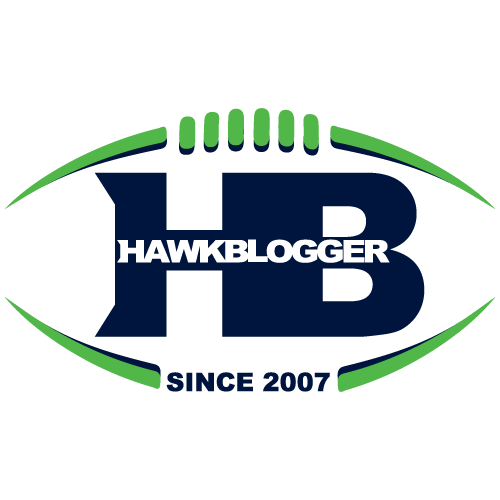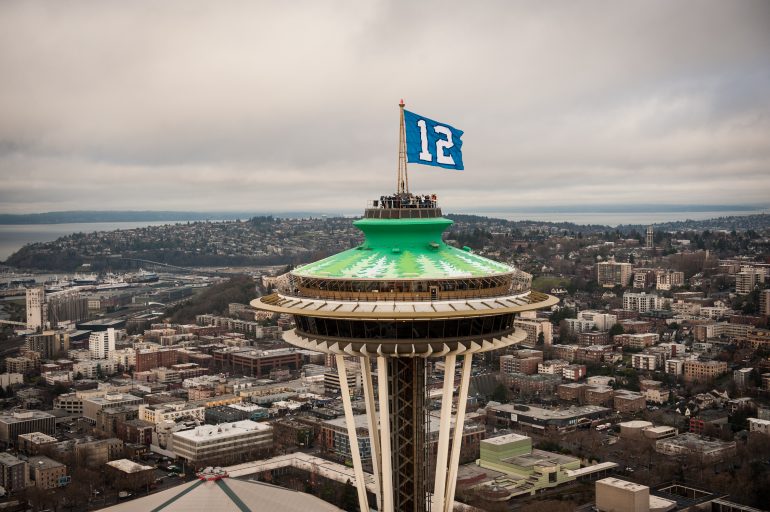

My room growing up was a shrine to all things sports. Ken Griffey Jr and Jay Buhner mixed with Clyde Drexler, Cliff Robinson, Jerome Kersey and Terry Porter. One of my proudest possessions was a poster of running back Curt Warner. This was the player who helped draw me into loving football, and loving the Seahawks. He was electric. Watching him shake defenders with moves that felt more at home in a video game made me proud to be a Seahawks fan, even when the team results were less than spectacular. Thirty years later, I had a chance to sit down with this franchise legend for a quick discussion.
Strained relationships and Seahawks strong safeties
Warner played with one of the best safeties to ever put on a uniform. Kenny Easley would be known as The Human Concussion Protocol if he played today. Ronnie Lott was better known, but Easley played at that same level and with that same intimidation factor. That relentless physical play led to pain that Easley managed with large doses of Advil, as many as 16-20 per day for three months. It was too much for his kidneys, and eventually forced him to retire in 1987.
Things became strained between Easley and the Seahawks organization became strained when they did not support him during this traumatic situation despite the fact that he was taking the medication under supervision from a team physician. It would be fifteen years until the two sides patched things up enough to induct Easley into the Seahawks Ring of Honor in 2002.
The cause may be different, but the relationship between the Seahawks organization and another dominant, hard-hitting safety has clearly been strained. I asked Warner what parallels he saw in both situations and any advice he would give Kam Chancellor
As an alumni, I can say this, which would be agreeable for everyone who is an ex-NFL player, you don’t realize it is business until you are done doing business. Now, what do I mean by that? You know, it’s going to end at some time. How it ends? Well that can be difficult. Why? Because from a player’s perspective, it’s more personal.
It’s a more rah-rah mentality. You take one for the Gipper. You know, you are told to do that, you do that. You play hurt. You play injured. You do a lot of things that I would consider above the call of business. So, on one hand, you are doing everything you can to be a team player. But on the other hand, you are just one step away from not being a part of the organization, from not being a member of the team. So, when something like [Chancellor’s contract situation] happens, it gets personal. Sometimes, what you have to realize, and you don’t realize until you get out, is logically, what’s the benefit of not playing versus the benefit of playing? Obviously, playing means you get paid, and right now, you are not going to get paid because you are not playing.
I get it from both sides, in terms of what they are thinking and how they are thinking. They have dug their heels in. Seahawks have a salary cap. Kam has been an integral part of the defense and feels like he is being underpaid. This guy got this, and this guy got that, and other safeties around the league got theirs. At the same time, you know, you signed a contract. But it’s not a binding contract. It’s a one year contract and the Seahawks can terminate that contract at any time. You are at a disadvantage. But at some point, though, you’ve got to come to your senses and say, “what’s best for all of us?”
The point about this being a one-year contract was a great point. Fans, the team, and the media can talk about Chancellor having three years left on his deal, but this is truly the final year considering he has no more guaranteed money after this season. It stops being a mutual contract at that point, and starts being a one-way agreement that only the team can get out of.
I asked Warner whether he looks back on his career and feels like he should have been more aggressive on the business side to get money or whether he wishes he had appreciated what he had being an NFL player:
It’s kind of a little bit of both. On one hand, you can always push for a little bit more. On the other hand, you’re not going to find a job where you are making x amount of dollars like this. You leave the business, you are not going to find one. But you know, when you win a Super Bowl, your value goes up. So [Chancellor] is entitled to voice his opinions and his concerns about what he thinks he’s worth. I don’t think anyone has a problem with that. The problem is that you are not playing, and neither side is at the advantage at this juncture until games are played. First game, you win. Second game, you win. Third game, you win. Well, you know, maybe we don’t need him right now. But at some point, you are going to need him. It’s a wait and see. You hate to see that both sides are in this predicament.
At this point, we were running tight on time, but I had discovered something in researching Warner before the interview that connected me to him in a new way. He has two special needs sons. Both were diagnosed with autism. My special needs son just turned eleven, and my wife and I are braced for what is sure to be a bumpy transition through puberty. Warner and his wife spoke at Penn St. about their experiences as parents and advice they would give.
One story that particularly hit home for me was when one of his sons, who perpetually thinks he is in a Disney movie, decided he was Pinocchio instead the whale and needed to escape the way it happened in the movie by setting a fire. The house ended up burning to the ground, and all of Warner’s NFL memorabilia went along with it. Thankfully, nobody was injured.
I asked Warner what it was like to transition from NFL star to everyday parent:
I don’t think there is any secret to how to do it. You have a responsibility as a parent. You have a responsibility as a husband to do certain things. It goes beyond what you think you should be doing. I like to call it a labor of love, because that’s what it turns into. I have two boys with autism, so it’s been a double blessing, and a double curse depending on how you want to look at it. I choose to say now, later in life, that it is more of a blessing, but prior to that, it was tough. I wouldn’t wish this on anybody.
When asked about any advice he had for parents who have special needs kids who are about to go through puberty, he opened his eyes wide and let out a half-sigh, half-chuckle before saying:
It’s probably best that I turn that question over to my wife. But, you know, it’s tough. How do you explain to them what is going on? I mean, you know how hard that time is when you don’t have special needs. When they have a tough time communicating, that is when things get really hard because you don’t know what they are thinking and they can’t explain it to you.
Warner and his wife recommended in their talk at Penn St. to write down the moment of laughter and joy, and to come back to those during the hard times. I’m pretty sure that is sage advice no matter what your life looks like, but is especially important when raising a special needs child.
Sports junkies tech tips
I want to thank Comcast for providing the opportunity to speak to Warner. They also shared some really cool advancements and tips for sports fans that I had access to for free without even knowing about.
X1 platform
I have been a Comcast subscriber for years and had the whole home DVR setup. They have been pushing this X1 thing for a while that I just ignored and assumed I needed to pay more to get it. Turns out, all I needed to do was exchange my existing cable boxes for new ones. They even shipped them to my house at no charge. Setup was simple. All the rest of the features I’m going to share depend on having X1. After years of that nasty old school menu interface, X1 feels like the difference between an iPhone and flip phone. It’s pretty slick.
Cloud DVR
Once you have X1, you can ask Comcast to turn on Cloud DVR (not available in all areas). I found out about it from @ComcastCares on Twitter. The rep turned it on for me without any cost or hassle. Now I can access shows or games from my DVR wherever I am on any device. I travel a ton for work, so now I can replay Seahawks games from my DVR on my laptop or iPad. I can also download things to my device to view even when I am offline, like on a plane. Very cool, especially for kid stuff. I usually use NFL Rewind, but it only works when there are not other games on, and I often want to replay a Seahawks game Sunday night, Monday night, or even Thursday night. This helps me get around that problem.
Auto-extend
We have all had that moment when the DVR did not record long enough due to a game delay or overtime. You can set to record for 30 minutes extra, or even an hour, but that is not always enough and it eats up space on your DVR. X1 has a feature called auto-extend that is guaranteed to always tape the full game until it is complete. Their platform is monitoring stats for the game (more on that in a sec), so they know when a game is over. This is brilliant stuff.
Sports app
If you hit the C button on your X1 remote, it brings up the sports app. That contains scores and stats from every game going on now, in the near future and recent past. You can get fantasy point reports on players as well. It’s a nice companion with RedZone or other shows so you can get specific scores and stats.
Lots of handy stuff. I was not paid to share this info, but I thought other Seahawks fans might appreciate knowing about it before we head into the season. Thanks again, to Comcast for arranging the discussion with Curt.

